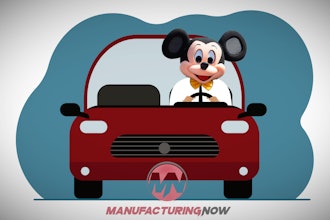By Dr. Ronald L. Hollis, Founder, President & CEO, Quickparts.com
What an interesting question to ask in a capitalistic market where, theoretically, there are many companies competing to serve customers with their products. Why wouldn’t the obvious answer be that the customer should expect the ultimate experience in service, quality, and even price?
Serving the customer is a standard requirement across most capitalistic market companies. Exceptions to this requirement could be extended government service entities, but the physics of business are different since the environment has been altered with the removal competitive forces. However, the reality of serving the customer is that providing the best in customer service is not the norm. The consumer typically requires skills of patience and concessions to continue to work with the companies they choose to patronize.
What are the reasons a consumer would consciously choose to spend their money with a company that does not provide the service, respect, consideration, or quality that one should receive? If we go with a basic premise of human behavior that most will make decisions that serve their own needs, then there must be something the company is providing that allows them to continue to exist, even when it may not be serving the customer.
What are the self-fulfilling needs that could be met with mediocrity and under-serving? Convenience, ignorance, and apathy. While there are many other reasons for the customer to continually choose to be abused, these are some top-level categories in which most should be able to fit.
Convenience. This is a no-brainer as to why a customer would choose to buy from companies that provide inferior customer service. Sometimes convenience is forced by the restriction of options. There may only be a single cable provider in your area, so they provide horrible customer service, but the convenience of having their product exceeds the dissatisfaction of supporting their success with your money.
Another example of convenience that is easy to understand is the gas station on the corner near your home. Not great service, but it’s easy to get in and get out for the basic necessity of automobile transportation. A customer is willing to sacrifice with poor customer service if the convenience exceeds the discomfort.
Ignorance. In a rapidly changing world, it can be hard to keep up with the latest options for the services you may need. So, ignorance, or lack of information about alternatives, could allow the customer to continue to experience the abuse of poor service.
Of course, ignorance can be easily overcome with effort. If one is fed up enough to research and validate substitutes for the service, then they have the chance to change their overall experiences. However, there are times when there are no alternatives or they are just as painful as the primary service. One could easily take the bus to work every day to avoid the inferior gas station, but is it worth it?
Apathy. This is one of the biggest for reasons that companies can continue to succeed despite their poor customer service. Once a customer becomes accustomed to the product and the service, their willingness to change can greatly diminish regardless of the customer experience. Apathy allows the customer to rationalize that all alternatives would be just as bad, more expensive, or less satisfying. It is human nature to resist change, which allows inertia to expand to the point that the experience one is getting from the company is not inferior but normal, and therefore there is not a problem. It is not until there is a new entrant into the market before the customer can realize they are having a poor experience.
Quickparts invented online, instant quoting to make the experience of buying custom parts faster and easier. Prior to this revolutionary change, the part-buying market was satisfied, or so they thought, with the old way of juggling RFQ’s. With the market influences of convenience, ignorance and apathy, many companies can continue to exist and grow.
With the acceptance of the consumer to concede, one would wonder if the strategic plans of many of these businesses include leveraging the convenience, ignorance or apathy of their market instead of using the fancier words of providing the best service, highest quality, or greatest value even when they clearly don’t. It would appear that facing reality is a challenge for the consumer and business. At the end of the day, consumers that receive poor customer service do so at their own choosing. It is not the fault of the company because the customer gets to vote everyday with their money as to who gets to stay in business and who does not.
If you would like to know more, check out my blog at ronhollis.blog.quickparts.com. Or for other great topics on product development, then check out the Quickparts.com encyclopedia for more information or get a hot copy of Better Be Running! Tools to Drive Design Success.
What an interesting question to ask in a capitalistic market where, theoretically, there are many companies competing to serve customers with their products. Why wouldn’t the obvious answer be that the customer should expect the ultimate experience in service, quality, and even price?
Serving the customer is a standard requirement across most capitalistic market companies. Exceptions to this requirement could be extended government service entities, but the physics of business are different since the environment has been altered with the removal competitive forces. However, the reality of serving the customer is that providing the best in customer service is not the norm. The consumer typically requires skills of patience and concessions to continue to work with the companies they choose to patronize.
What are the reasons a consumer would consciously choose to spend their money with a company that does not provide the service, respect, consideration, or quality that one should receive? If we go with a basic premise of human behavior that most will make decisions that serve their own needs, then there must be something the company is providing that allows them to continue to exist, even when it may not be serving the customer.
What are the self-fulfilling needs that could be met with mediocrity and under-serving? Convenience, ignorance, and apathy. While there are many other reasons for the customer to continually choose to be abused, these are some top-level categories in which most should be able to fit.
Convenience. This is a no-brainer as to why a customer would choose to buy from companies that provide inferior customer service. Sometimes convenience is forced by the restriction of options. There may only be a single cable provider in your area, so they provide horrible customer service, but the convenience of having their product exceeds the dissatisfaction of supporting their success with your money.
Another example of convenience that is easy to understand is the gas station on the corner near your home. Not great service, but it’s easy to get in and get out for the basic necessity of automobile transportation. A customer is willing to sacrifice with poor customer service if the convenience exceeds the discomfort.
Ignorance. In a rapidly changing world, it can be hard to keep up with the latest options for the services you may need. So, ignorance, or lack of information about alternatives, could allow the customer to continue to experience the abuse of poor service.
Of course, ignorance can be easily overcome with effort. If one is fed up enough to research and validate substitutes for the service, then they have the chance to change their overall experiences. However, there are times when there are no alternatives or they are just as painful as the primary service. One could easily take the bus to work every day to avoid the inferior gas station, but is it worth it?
Apathy. This is one of the biggest for reasons that companies can continue to succeed despite their poor customer service. Once a customer becomes accustomed to the product and the service, their willingness to change can greatly diminish regardless of the customer experience. Apathy allows the customer to rationalize that all alternatives would be just as bad, more expensive, or less satisfying. It is human nature to resist change, which allows inertia to expand to the point that the experience one is getting from the company is not inferior but normal, and therefore there is not a problem. It is not until there is a new entrant into the market before the customer can realize they are having a poor experience.
Quickparts invented online, instant quoting to make the experience of buying custom parts faster and easier. Prior to this revolutionary change, the part-buying market was satisfied, or so they thought, with the old way of juggling RFQ’s. With the market influences of convenience, ignorance and apathy, many companies can continue to exist and grow.
With the acceptance of the consumer to concede, one would wonder if the strategic plans of many of these businesses include leveraging the convenience, ignorance or apathy of their market instead of using the fancier words of providing the best service, highest quality, or greatest value even when they clearly don’t. It would appear that facing reality is a challenge for the consumer and business. At the end of the day, consumers that receive poor customer service do so at their own choosing. It is not the fault of the company because the customer gets to vote everyday with their money as to who gets to stay in business and who does not.
If you would like to know more, check out my blog at ronhollis.blog.quickparts.com. Or for other great topics on product development, then check out the Quickparts.com encyclopedia for more information or get a hot copy of Better Be Running! Tools to Drive Design Success.






















